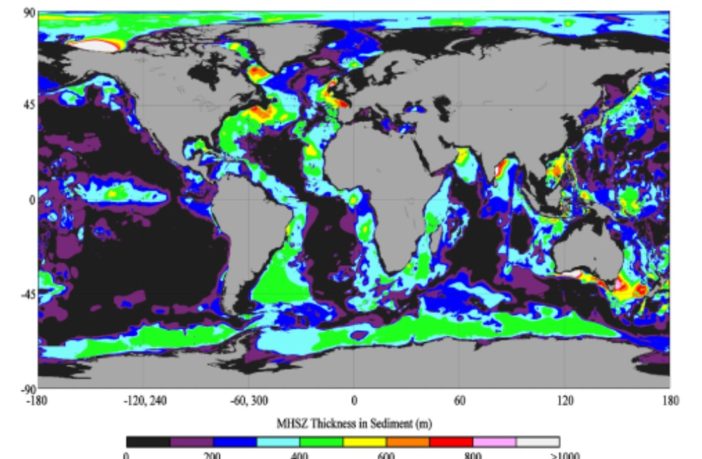Our Earth acts as a giant carbon sink. It stores the remains of ancient plants in oil and gas, permafrost, and methane in ice below the sea bed. The Global Carbon Project has known about these ocean methane stores for a long time. This is because it is the custodian of our knowledge of the carbon cycle. Now there is a Japanese project to bring gas hydrates (methane gas in frozen water) to the surface.
Gas Hydrates in Ice That Literally Burns
Large sediment deposits normally covering the gas hydrates have eroded away off the south Japanese coastline. These are among the richest fields on earth, although there are other lodes scattered around the planet.

If we were to bring a handful to the surface we would feel it fizz in our palm. This is methane gas escaping, and if we light it, the ice will burn. There is a staggering amount of this ‘fiery ice’ below the oceans in the floor. Moreover this equates to about a third of the total carbon held in other fossil fuels such as oil, gas and coal. Now the BBC reports Japanese companies have begun a project to mine gas hydrates.
Global Carbon Project Posts a Somber Warning
Bringing the gas hydrates to the surface is impractical, because they are unstable and break down rapidly. The Japan Oil, Gas and Metals National Corporation has however succeeded in drilling into them, and capturing the methane successfully. Is this a solution to our energy needs?
It would be a very short-sighted stopgap according to an IOP Science report released in 2009. A few degrees of warming in the deep ocean could affect the stability of the hydrates. This would trigger “significant methane releases from hydrates and thus could lead to strong positive carbon – climate feedback.” Therefore we should leave the methane hydrates undisturbed, surely?

Moreover, the Union of Concerned Scientists warns that burning natural gases increases concentrations of hazardous air pollutants. These can lead to adverse health outcomes, including respiratory symptoms, cardiovascular disease, and cancer.
Therefore we need more objective research, before we tamper with the gas hydrates slumbering under ocean sediments. Until then, let’s rather get on with wind and solar projects instead.
Related
Greenhouse Gases We Cause Part 2: Methane
Why We Owe Our Life to CO2 and Methane
Preview Image: Distribution of Known Methane Hydrate Accumulations




